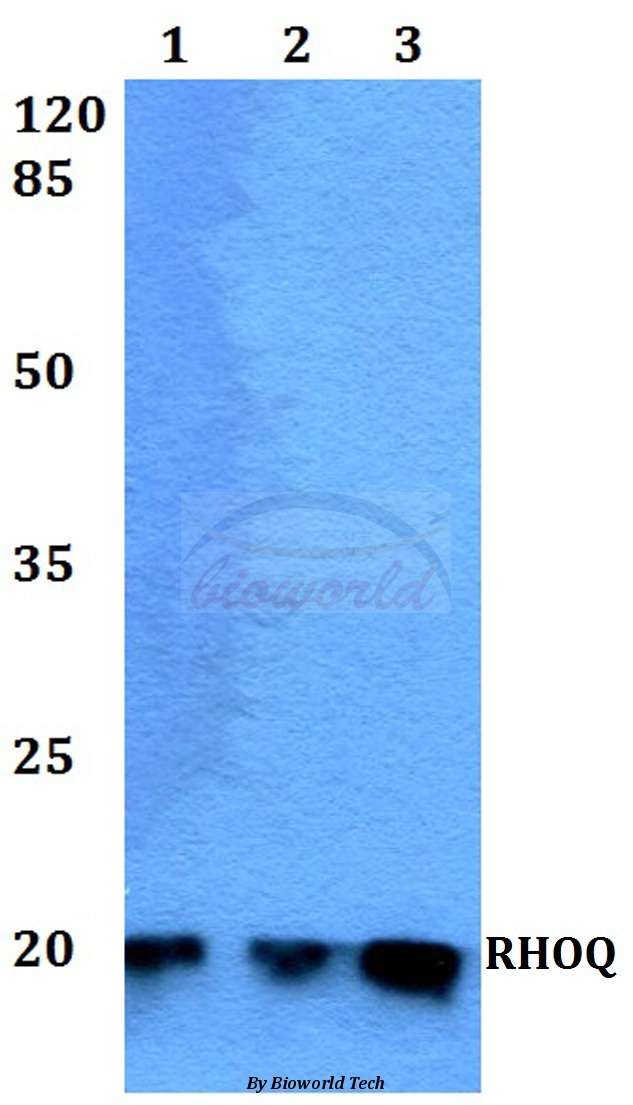Product Name :
RHOQ polyclonal antibody Background :
tc10 is a small GTP-binding protein that is induced during nerve injury, where it cooperates with other Rho family members to facilitate nerve regeneration and, in particular, neurite elongation. tc10 is located predominantly in the plasma membrane, a property that depends both on its post-translational prenylation and on its ability to bind and hydrolyze GTP. tc10 colocalizes to actin filaments and interacts with the actin-binding and filament-forming protein, profilin. tc10 functions to regulate cellular signaling to the actin cytoskeleton and processes associated with cell growth. tc10 also interacts with a similar subset of effectors for Cdc42 and is regulated differentially by p50Rho GTPase-activating protein. Activated tc10 interacts with a variety of putative Rho family effectors, stimulates JNK, and induces filopodial formation. Product :
Rabbit IgG, 1mg/ml in PBS with 0.02% sodium azide, 50% glycerol, pH7.2 Storage&Stability :
Store at 4°C short term. Aliquot and store at -20°C long term. Avoid freeze-thaw cycles. Specificity :
RHOQ polyclonal antibody detects endogenous levels of RHOQ protein. Immunogen :
A synthetic peptide corresponding to residues in Human RHOQ. Conjugate :
Unconjugated Modification :
Unmodification
RHOQ polyclonal antibody Background :
tc10 is a small GTP-binding protein that is induced during nerve injury, where it cooperates with other Rho family members to facilitate nerve regeneration and, in particular, neurite elongation. tc10 is located predominantly in the plasma membrane, a property that depends both on its post-translational prenylation and on its ability to bind and hydrolyze GTP. tc10 colocalizes to actin filaments and interacts with the actin-binding and filament-forming protein, profilin. tc10 functions to regulate cellular signaling to the actin cytoskeleton and processes associated with cell growth. tc10 also interacts with a similar subset of effectors for Cdc42 and is regulated differentially by p50Rho GTPase-activating protein. Activated tc10 interacts with a variety of putative Rho family effectors, stimulates JNK, and induces filopodial formation. Product :
Rabbit IgG, 1mg/ml in PBS with 0.02% sodium azide, 50% glycerol, pH7.2 Storage&Stability :
Store at 4°C short term. Aliquot and store at -20°C long term. Avoid freeze-thaw cycles. Specificity :
RHOQ polyclonal antibody detects endogenous levels of RHOQ protein. Immunogen :
A synthetic peptide corresponding to residues in Human RHOQ. Conjugate :
Unconjugated Modification :
Unmodification
-
 Western blot (WB) analysis of RHOQ polyclonal antibody at 1:500 dilution Lane1:HEK293T whole cell lysate Lane2:Raw264.7 whole cell lysate Lane3:H9C2 whole cell lysate
Western blot (WB) analysis of RHOQ polyclonal antibody at 1:500 dilution Lane1:HEK293T whole cell lysate Lane2:Raw264.7 whole cell lysate Lane3:H9C2 whole cell lysate
Bioworld Biotech only provide peptides for our antibodies and do not provide additional peptide customization services.
Price/Size :
USD 368/1mg/vial
Tips:
For phospho antibody, we provide phospho peptide(0.5mg) and non-phospho peptide(0.5mg).Describe :
Blocking peptides are peptides that bind specifically to the target antibody and block antibody binding. These peptide usually contains the epitope recognized by the antibody. Antibodies bound to the blocking peptide no longer bind to the epitope on the target protein. This mechanism is useful when non-specific binding is an issue, for example, in Western blotting (WB) and Immunohistochemistry (IHC). By comparing the staining from the blocked antibody versus the antibody alone, one can see which staining is specific; Specific binding will be absent from the western blot or IHC performed with the neutralized antibody.Formula:
Synthetic peptide was lyophilized with 100% acetonitrile and is supplied as a powder. Reconstitute with 0.1 ml DI water for a final concentration of 10 mg/ml.The purity is >90%,tested by HPLC and MS.
Storage:
The freeze-dried powder is more stable. For short time at 2-8°C. For long term storage store at -20°C.
Note :
This product is for research use only (RUO only). Not for use in diagnostic or therapeutic procedures.
 RHOQ polyclonal antibody
RHOQ polyclonal antibody  Datasheet
Datasheet COA
COA MSDS
MSDS SHIP
SHIP